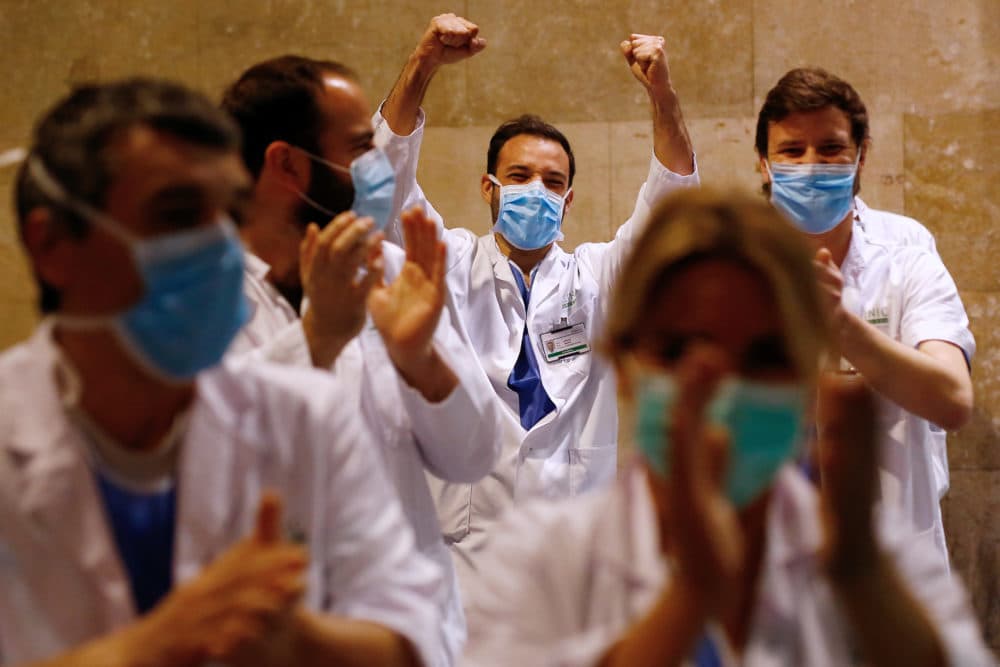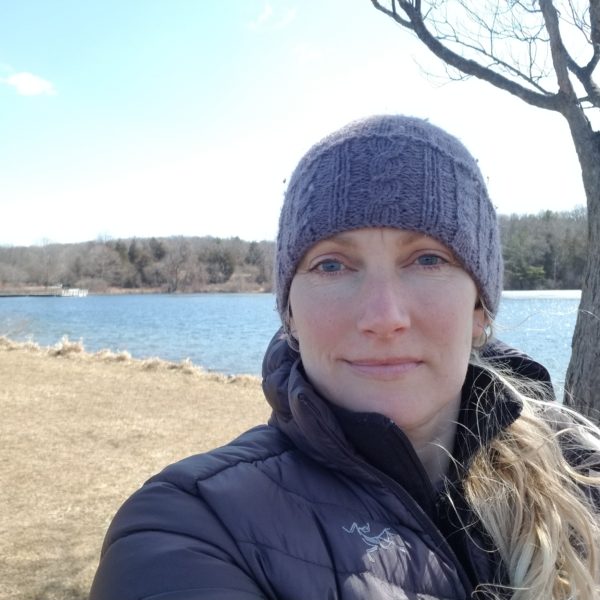Advertisement
What Disasters Reveal About Hope And Humanity

“What if everything we’ve been told about human nature is wrong?” That’s the question Rebecca Solnit is asking. The author, activist and historian explores whether disasters like pandemics reveal a surprising truth – that human beings are more generous, more altruistic, more hopeful than we commonly believe.
Guests
Rebecca Solnit, writer, author, activist and historian. She is the author of more than twenty books on feminism, Western history, social change and insurrection, popular power and hope and disaster, among other topics. Author of "Recollections of My Nonexistence," "A Paradise Built in Hell: The Extraordinary Communities that Arise in Disaster" and "Hope in the Dark: Untold Histories, Wild Possibilities."
Jack Beatty, On Point news analyst. (@JackBeattyNPR)
Interview Highlights
On finding hope during disaster
Rebecca Solnit: “What I call hope is really just full recognition of the unpredictability of the future, because both pessimists and optimists join forces in assuming they know what's going to happen next, and that it requires nothing of us. My vision of hope is a sense of radical uncertainty, with the possibility of intervention, to shape the future. And in disasters, there's always a power struggle.
"We’re seeing authoritarians all over the world to seize more power. Hungary just became a dictatorship effectively. We're seeing power grabs in our own country and the Philippines, etc. But we also see mutual aid and political struggles. And crises that often discredit the ruling powers show people a kind of fearlessness power from below and possibility for radical change that can also shape the outcome. And we've seen that in many cases, as well, in the wake of disasters.”
"My vision of hope is a sense of radical uncertainty, with the possibility of intervention, to shape the future."
Rebecca Solnit
On how disasters like a global pandemic can result in 'powerful intervention'
Rebecca Solnit: “We live in a country and a culture that enthusiastically deemphasizes the power of ordinary people over and over and over again. You know, tells the story of Rosa Parks as a tired lady who sat down on a bus. Rather than a brilliant political organizer who catalyzed a movement she was committed to. And we like to tell the story that the power all rests in the hands of the officially powerful. But it's more complicated than that.
"And then a habit I think that's common to human beings all over is wanting to know what's going to happen. And that often means that we accept as inevitable what the future is going to look like. And that gets us off the hook, because what I found when I started talking about hope in the wake of that outbreak of war 17 years ago this month, is that a lot of people didn't want help because it saddled them with responsibility.
"If we could determine the outcome, we better get to work. We better recognize the nature of our power. And I've found a lot of desperate people, the Coalition of Immokalee Workers in Florida, the Zapatistas, etc. are actually often very hopeful because alternative to them is truly terrible. For a lot of more comfortable people the alternative is binge-watching shows and, you know, eating snacks on the couch and complaining. And that is comfortable in its own way.”
"A habit I think that's common to human beings all over is wanting to know what's going to happen. And that often means that we accept as inevitable what the future is going to look like."
Rebecca Solnit
On how hope binds humanity
Rebecca Solnit: “It began as I was researching for the 100th anniversary of the 1906 earthquake here in San Francisco. And what I found corresponded to my own experience of the 1989 earthquake. That there had been not only an extraordinary upwelling of ordinary people reaching out to do what needed to be done to take care of each other. But in that, an incredible sense of joy, and power and connection that was missing in everyday life.
"And one thing even the largest disasters [sometimes] illuminates is the ways in which everyday life can also be a kind of disaster of alienation, meaninglessness, powerlessness. A sense that people don't have the connections and meaningful work, meaningful roles that they really yearn for. And, you know, disasters are, first of all, horrible. And I have never wished, ‘Oh, now we should have a disaster because all these good things happen.’
"But even though I wish there wasn't a pandemic, even though I wish these things didn't happen, they do happen. And recognizing the radical social reorganization within them, which often scares the socks off the powers-that-be is really important. As is recognizing that panic and looting are not actually widespread common responses. And within that is a whole different sense of human nature than the ones we're commonly given.”
"One thing even the largest disasters [sometimes] illuminates is the ways in which everyday life can also be a kind of disaster of alienation, meaninglessness, powerlessness."
Rebecca Solnit
On systemic changes that come out of a pandemic
Rebecca Solnit: “These are not things we would choose, but suddenly they're with us. And within them there are real possibilities to connect in different ways. There is a way that the old stabilities break up and that can be terrifying when you see systemic failure, government failure, institutional failure, inadequate medical supplies and protective gear in these cases, the financial emergency so many are facing.
"But there's also the possibility of radical change because many of these things — financial desperation and inequality and, you know, callous and selfish government — were already with us. And now we're looking at them in a kind of stark new light. And there is a real possibility of change. Disasters shake things loose. And the things that we regarded as fixed and unchangeable can suddenly be changed. It's been fascinating seeing people in power suddenly say, ‘Well, actually, we can put all these homeless people up in hotels. Actually, we can change unemployment insurance and sick leave. Actually, we can find $3 trillion to throw at a problem.’
"You know, this sense that suddenly everything can be profoundly different because something terrible has happened does remind us that everything can be profoundly different, maybe even not just because something terrible has happened. The powerful are often scrambling to restore a status quo that worked very well for them. The less powerful are often saying, ‘Wow, everything has changed. We're not ready to change it all back.’”
Advertisement
"Disasters shake things loose. And the things that we regarded as fixed and unchangeable can suddenly be changed."
Rebecca Solnit
From The Reading List
The New York Times: "Who Will Win the Fight for a Post-Coronavirus America?" — "The scramble has already begun. The possibilities for change, for the better or the worse, for a more egalitarian or more authoritarian society, burst out of the gate like racehorses at times like these.
"Progressive and conservative politicians are pitching proposals to radically alter American society, to redistribute wealth, to change the rules, to redefine priorities. The pandemic has given the Trump administration an excuse to try to shut down borders and, reportedly, a pretext to try to secure the unconstitutional capacity to detain people indefinitely. Congresswoman Ayanna Pressley, among others, has made the case for reducing the prison population, whose crowding in poor conditions constitutes a health risk — for freeing people, rather than the opposite, in response to the crisis.
"Other progressives have sought to expand workers’ rights, sick leave and implement other policies that would improve lives even in ordinary times. Social programs long said to be impossible may well come to pass; so could authoritarian measures.
"Every disaster shakes loose the old order: The sudden catastrophe changes the rules and demands new and different responses, but what those will be are the subject of a battle. These disruptions shift people’s sense of who they and their society are, what matters and what’s possible, and lead, often, to deeper and more lasting change, sometimes to regime change. Many disasters unfold like revolutions; the past gives us many examples of calamities that led to lasting national change."
The New York Times: "How Rebecca Solnit Found Her Voice" — "At dinner one evening in 2008, Rebecca Solnit joked to a friend about writing an essay called 'Men Explain Things to Me.' The friend, who was staying with Solnit 'in flight from an awful soon-to-be ex,' told her that such an essay was definitely worth writing — younger women needed it.
"So in one sitting early the next morning, Solnit did so, describing her encounter with a man who explained her own book to her at a party, and the silencing of women by men in general. The essay, which surprised her by going viral, 'poured out with ease or rather tumbled out seemingly of its own accord,' Solnit writes in her new memoir, 'Recollections of My Nonexistence.' 'When this happens it means that the thoughts have long been gestating and writing is only a birth of what was already taking form out of sight.'
"While 'Men Explain Things to Me' introduced her work to a broader audience, Solnit has long been known for a particular style of prose that refracts history, politics, personal experience and criticism through a poetic lens. Her more than 20 books feature wide-ranging yet incisive reflections on time, memory, art, mythology and the American West."
CBC: "'In disasters, most people are altruistic, brave, communitarian, generous…' says Rebecca Solnit" — "Writer Rebecca Solnit's incessant curiosity drives her to explore everything, from nuclear testing to photography to the hidden conflicts embedded in maps.
"Over the course of her more than 20 books, she has written about atlases, Alzheimer's, the history of walking, climate change, the desert, fairy tales, the color blue, punk music and contemporary politics.
"In her new memoir, Recollections of My Nonexistence, she writes about how San Francisco and the American West shaped her as a person, how she came to understand the epidemic of violence against women, and how she developed her voice in a world that wants to keep women silent."
This program aired on March 31, 2020.

